#eusthenopteron
Explore tagged Tumblr posts
Text
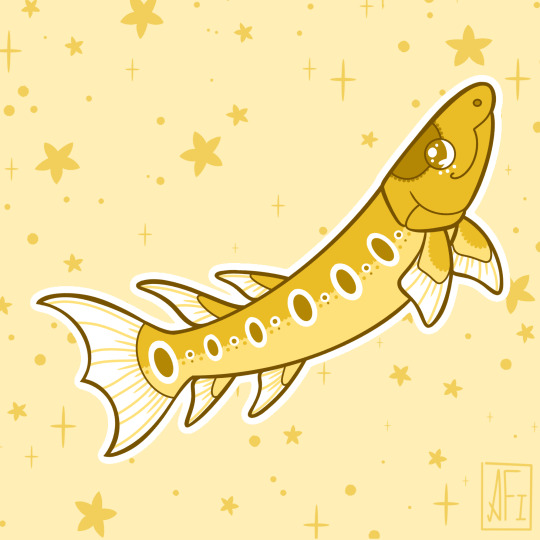
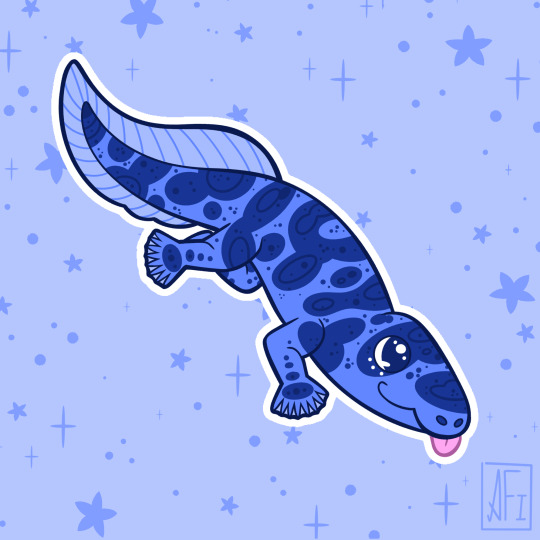
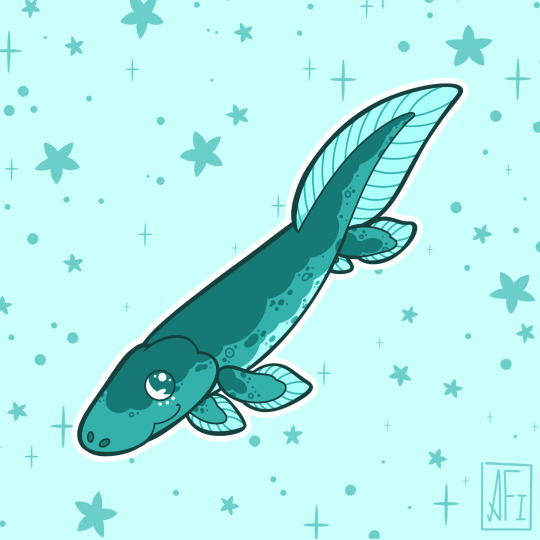

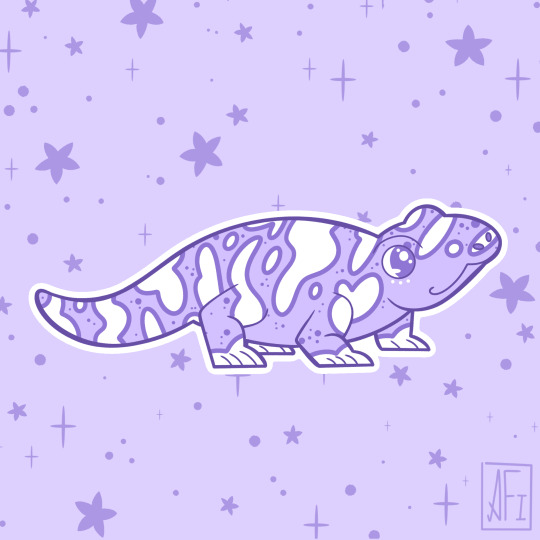
The Fish-o-Pods!
Thanks to these guys you get to vote and pay taxes. What a world! It may not a direct lineage of fish -> fish-o-pod -> not a fish like we see in some diagrams; some of these guys may have lived too close in time to one another to be direct relatives. They do show the progression of lobe finned fishes (like Eusthenopteron) to more land oriented creatures (like Ichthyostega) Stickers here!
Free Phone Wallpaper Links: Eusthenopteron - Acanthostega Tiktaalik Hynerpeton - Ichthyostega
#art#my art#paleoart#paleontology#science#illustration#tiktaalik#acanthostega#ichthyostega#eusthenopteron#hynerpeton#ancient fish#sarcopterygian#lobe finned fishes#paleo party
85 notes
·
View notes
Text

Eusthenopteron in hats
#simon says#my art#art#artists on tumblr#digital artist#paleoart#digital art#paleontology#prehistoric animals#eusthenopteron#this took so long lmaoooo#but hoooo boy#super fun and good practice in lineless art and drawing fish#i would tag this as theropod but the Eusthenopteron was just a close relative#tristichopteridae#terapodomorph#i have no idea how to tag this lmaooooo#it's a prehistoric animal babey!!#I use an illustration from a dinosaur book I have as the main reference for both color and fins#but I saw that some recreations have the fins look more shark-like#but by the time I saw those recreations I was already too far in lmaooo#get pretty pretty fish fins and colors
179 notes
·
View notes
Text
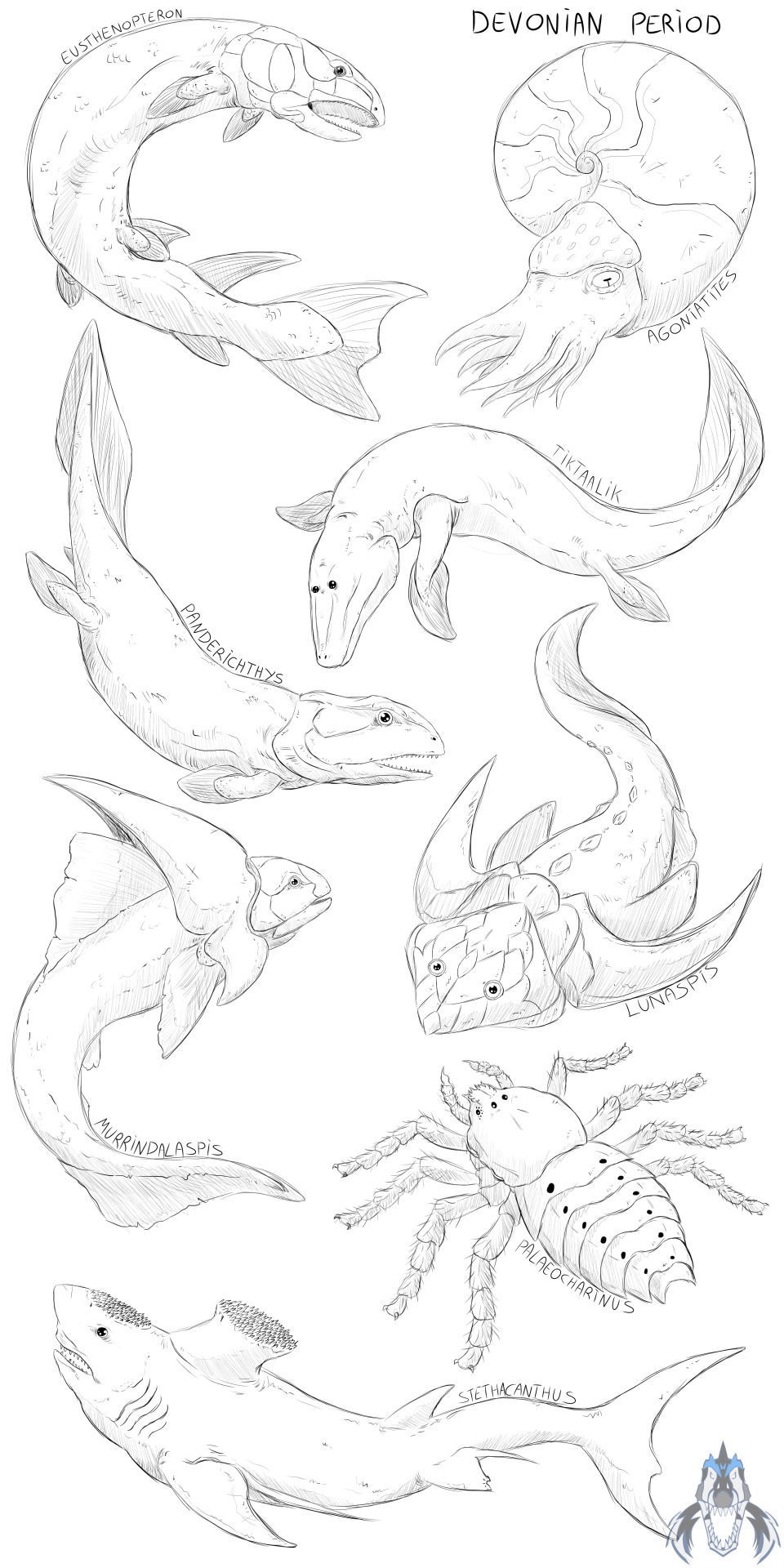
Some devonian fellas
#prehistoric animals#devonian period#paleozoic#eusthenopteron#agoniatites#tiktaalik#panderichthys#lunaspis#murrindalaspis#palaeocharinus#stethacanthus#paleoart
31 notes
·
View notes
Text






Eusthenopteron
(size: 1.5 to 2.1 m / 4.9 to 6.9 '; temporal range: 385 mio. years ago)
[text from the Wikipedia article, see also link above]
Eusthenopteron (from Greek: εὖ eû, 'good', Greek: σθένος sthénos, 'strength', and Greek: πτερόν pteron 'wing' or 'fin')[2] is a genus of prehistoric sarcopterygian (often called lobe-finned fishes) which has attained an iconic status from its close relationships to tetrapods. Early depictions of this animal show it emerging onto land; however, paleontologists now widely agree that it was a strictly aquatic animal.[3] The genus Eusthenopteron is known from several species that lived during the Late Devonian period, about 385 million years ago. Eusthenopteron was first described by J. F. Whiteaves in 1881, as part of a large collection of fishes from Miguasha, Quebec.[4] Some 2,000 Eusthenopteron specimens have been collected from Miguasha, one of which was the object of intensely detailed study and several papers from the 1940s to the 1990s by paleoichthyologistErik Jarvik.
7 notes
·
View notes
Text
By the way if I continue the series in Canada it’ll mostly be fish

I have hit 1k notes on one of my posts 🎉🎉
8 notes
·
View notes
Text
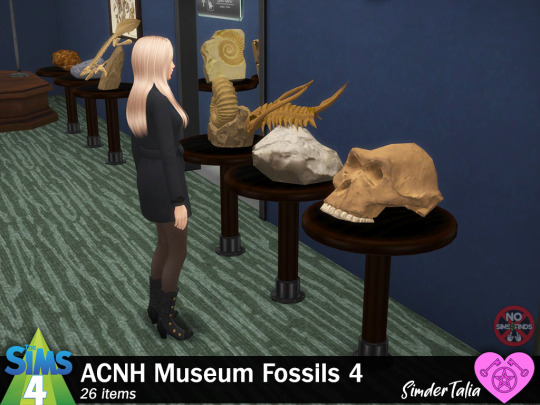
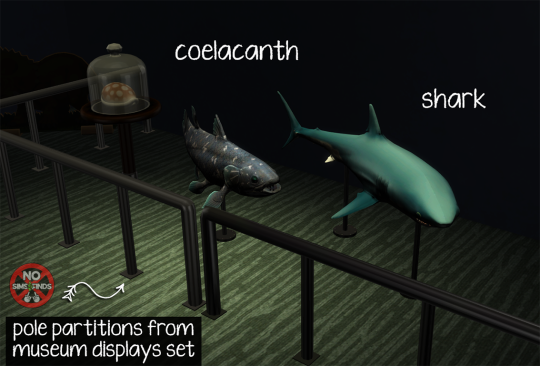
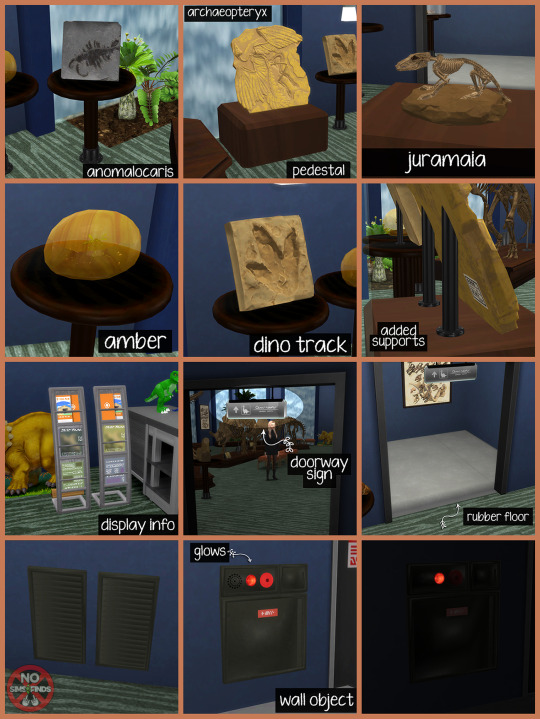
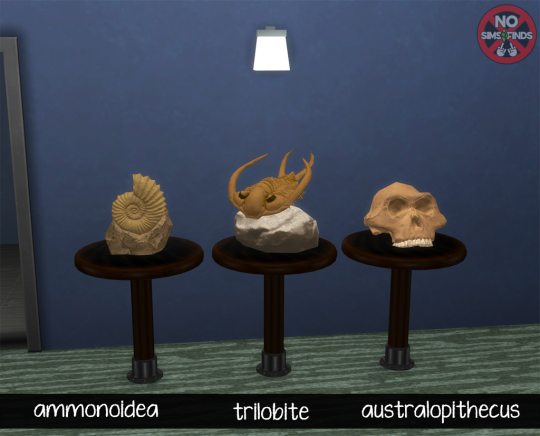
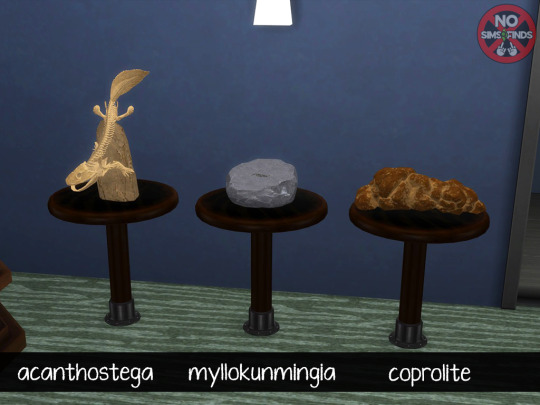
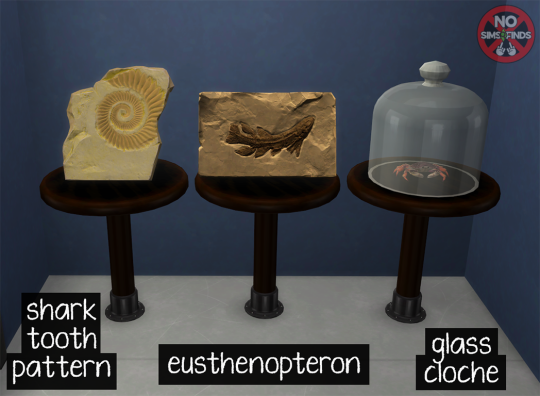


🔍🦎 ACNH Museum Fossils Set 4 🦖🔍
Sims 4, base game compatible. 26 items
I hope you enjoy!
Always suggested: bb.objects ON, it makes placing items much easier. For further placement tweaking, check out the TOOL mod.
Set Contains: Buy: -Acanthostega | 1 swatch | 924 poly -Amber (mosquito inside) | 2 swatches | 869 poly -Ammonoidea | 1 swatch | 610 poly -Anomalocaris | 1 swatch | 734 poly -Archaeopteryx | 1 swatch | 1622 poly -Australopithecus | 1 swatch | 418 poly -Coelacanth Display | 1 swatch | 1398 poly -Coprolite | 1 swatch | 654 poly -Dino Track | 1 swatch | 1044 poly -Display Cloche | 1 swatch | 964 poly -Display Info 1 & 2 | 4 swatches each | 370 poly each -Display Pedestal | 3 swatches | 38 poly -Display Table | 2 swatches | 782 poly -Doorway Sign | 2 swatches | 150 poly -Emergency Exit Sign (glows) | 4 swatches | 112 poly -Eusthenopteron | 1 swatch | 1368 poly -Juramaia | 1 swatch | 810 poly -Meteor Ceiling Decor | 1 swatch | 471 poly -Myllokunmingia | 1 swatch | 410 poly -Shark Display | 1 swatch | 2170 poly -Shark Tooth Pattern | 1 swatch | 800 poly -Trilobite | 1 swatch | 1011 poly -Wall Object (with red light) | 2 swatches (one for green light) | 508 poly -Wall Vents | 1 swatch | 262 poly
Build: Floor: Rubber | 6 swatches | Linoleum & Misc
📁 Download all or pick & choose (SFS, No Ads): https://simfileshare.net/folder/212575/
📁 Alt Mega Download (still no ads): https://mega.nz/folder/4hxFkQga#7L92mwjA25qUP_Qi7pMH5g
📁 Download On Patreon
Will be public on March 9th, 2024 💗
Happy Simming! ✨ Some of my sets will be early access from now on. If you like my work, please consider supporting me:
★ Patreon 🎉 ❤️ |★ Ko-Fi ☕️ ❤️ ★ Instagram📷
Thank you for reblogging ❤️ ❤️ ❤️
@sssvitlanz @maxismatchccworld @mmoutfitters @coffee-cc-finds @itsjessicaccfinds @gamommypeach @stargazer-sims-finds @khelga68 @suricringe @vaporwavesims @mystictrance15 @moonglitchccfinds @xlost-in-wonderlandx @jbthedisabledvet @public-ccfinds
-Museum Fossils Set 1 (public from day of post) -Museum Fossils Set 2 (public from day of post) -Museum Fossils Set 3 (public at midnight tonight) -Pamphlet Holder from Reiki Set ☄️Don’t forget the meteor impact display!
The rest of my CC
#s4cc#ts4cc#sims 4 museum#sims 4 dinosaur#sims 4 display#sims 4 pedestal#sims 4 statue#sims 4 fossil#sims 4 maxis match#sims 4 fossils#sims 4 crystals and minerals#sims 4 historical#sims 4 object
245 notes
·
View notes
Text
Tiktaalik is such an important fossil species! Studying this species along with Acanthostega, Eusthenopteron, Ichthyostega, and Panderichthys. We can better understand the sea to land transition that took place so long ago!


4 notes
·
View notes
Text

eusthenopteron I live you but I think next time I will draw a catfish shark ray chimera skate moray eel sturgeon paddlefish sailfifn blennie combtooth blennie hagfish or perhaps lamprey
4 notes
·
View notes
Text
GOOD NEWS! Guess what the fish were able to do!

[id: An image showcasing the cladogram of the evolution of tetrapods showing some of the best-known transitional fossils. It starts with Eusthenopteron at the bottom, indisputably still a fish, through Panderichthys, Tiktaalik, Acanthostega and Ichthyostega to Pederpes at the top, indisputably a tetrapod.]
“If tumblr shut down what other social media would u use” you are literally asking a fish what it would do if all the water in the world dried and it had to live on land
61K notes
·
View notes
Text












Fish of the Paleozoic! ... holy lobe fins, I have so many Paleozoic fish xD
Find these and fish from the Mesozoic and Cenozoic in my Ancient Fish Listing!!
Sacabambaspis - Astraspis - Birkenia
Eusthenopteron - Bothriolepis - Cephalaspis
Materpiscis - Titanichthys - Dunkleosteus
Hyneria - Rhizodus - Coelocanthus
Shop || Phone Wallpapers
#art#my art#paleoart#paleontology#science#illustration#fish#paleozoic#dunkleosteus#bothriolepis#sacabambaspis#astraspis#birkenia#eusthenopteron#titanichthys#hyneria#rhizodus#coelacanthus
86 notes
·
View notes
Text


From Prehistoric Animals, written/illustrated by William E. Scheele. 1954.
1.) Eusthenopteron
2.) Dipterus
194 notes
·
View notes
Text
Eusthenopteron, my beloved
rediscovering ray troll's art in my fish era is such a delight. that guy makes art that sounds like his name. he was so right about fish worship
58K notes
·
View notes
Text
Animal Crossing Fish - Explained #133
Brought to you by a marine biologist who is the big dumb...
CLICK HERE FOR THE AC FISH EXPLAINED MASTERPOST!
I am so dumb. I said the trilobite was the last fossil because I evidently forgot we didn’t actually cover this dude yet. Now everything is ruined. Oh well. So, today we will be the last fossil we are covering for real- Eusthenopteron.

It’s a long name, I know, but you can do it. -> yoos-then-OP-tare-on.
At the beginning of this series, when we spoke about the Coelacanth, we talked about tetrapod evolution, which is a wild ride. Chordata, the Phylum we as humans belong, is pretty awesome. We had such humble beginnings, and by now we have consistently been most of the largest organisms to ever grace this planet, right after the plants. Between dinosaurs, whales, and some sizeable fish, chordates, and more specifically, vertebrates, have dominated in size. We also have dominated ecosystems ever since we evolved jaws and began preying really efficiently on everything else, including each other. Although we have almost never been the first at anything major - we weren’t the first predators and we certainly weren’t the first on land - we have done it really well anyway.
We talked about how tetrapods - four-legged vertebrates - came to be via evolution from the fish body plan. Eusthenopteron is just one species within that transition. It, as well as Acanthostega and the Coelacanth, are lobe-finned fish, fish that actually have supporting bone in their fins, which eventually evolved into the sturdy arms and legs of tetrapods we see today. The fossil in ACNH is most likely based off this one of Eusthenopteron foordi, a really great fossil that preserved the whole fish since the Devonian (some 385 million years ago).

By Haplochromis, CC BY-SA 3.0, https://commons.wikimedia.org/w/index.php?curid=6532784
Here’s what it might have looked like in life.

By Dr. Günter Bechly - Own work, CC BY-SA 3.0, https://commons.wikimedia.org/w/index.php?curid=17059501
Is now a good time to talk about how all tetrapods, including you and me, are just really weird fish? Cladistically-speaking, we are all just fish. These days, it’s easy to separate fish from other vertebrates - they have gills and live their lives restricted to the water. If you look back to the Devonian, however, the line between fish and other tetrapods is blurred. The animals we collectively call “fish” are VERY DISTANTLY related to each other as a whole. You and your cat are so much more closely related than a goldfish is to a shark. Likewise, you and the goldfish are also more closely related to each other than either is to the shark. See where it gets weird?
In phylogeny, we try very hard to keep groups of animals monophyletic - this is a big word that means a group of organisms includes their common ancestor and every one of its descendent species. For instance, the group “Mammalia” is monophyletic, because the term encompasses all mammals, no matter how derived, like the whales. In contrast, a paraphyletic group is one in which an ancestor is grouped with only some of its descendants, typically with one very derived group simply left out. “Reptilia” aka the reptiles, are a great example of a paraphyletic group, because the term includes all reptiles (crocodiles, lizards, snakes, dinosaurs) except for the birds, who are still dinosaurs, but because they do the flying and feather thing, we’ve set them apart specially. “Fish” as a group, include all fish, except for the very special lobe-finned fish group, the tetrapods. ‘Fish” is, therefore paraphyletic, as a term. Obviously, we can decide that we are fine with the term “fish” meaning only vertebrates that have gills and live in water, for every-day means...but it’s fascinating to just delve into this clusterfuck of terms we made before we knew just how connected life on Earth really is.
And there you have it. Fascinating stuff, no?
#eusthenopteron#fossil#acnh#phylogeny#animal crossing#lobe-finned fish#fish#marine biology#animal crossing new horizons#science in video games#animal crossing fish explained
8 notes
·
View notes
Text
eusthenopteron and tiktaalik do a set at a bar call that a conical stand up
6 notes
·
View notes
Text

Day 1: Fish
#inktober#inktober2020#inktober day 1#traditional art#illustration#fish#animals#eusthenopteron#paleoart#prehistoric fish#artists on tumblr
9 notes
·
View notes
